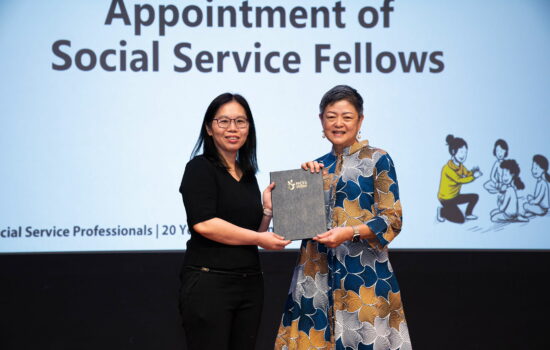Our board advisory member Ms Chia Yong Yong shares her opinion on sustainable and strategic corporate giving in this article first published in The Straits Times on 22 January 2023.
I remember when Christmas and Chinese New Year were not happy times. While others were celebrating with what they had, we were managing with what we did not.
Our parents scrimped and saved, worried about how they could afford to buy new clothes for us, buy new year delicacies and give us hongbao.
As we grew older, we worried along with our parents, and “recycled” our hongbao money for them to use for other hongbao. I remember the stress and sense of guilt they felt for not being able to give us what our peers enjoyed.
During festive seasons like this Chinese New Year, spare a thought for families facing financial challenges. With Singapore’s economic growth forecast to slow down amid global uncertainties, what will this year bring? Who among us will lose our jobs?
Although there are various assistance schemes in Singapore to support persons in need, such support cannot come from the Government alone. Each of us within the community – individuals and corporations – must work hand in hand with the Government and persons in need.
Riding on the rise of volunteerism and donations in support of people adversely affected by the Covid-19 pandemic, it may be timely for businesses to re-examine their giving philosophy and set up programmes to give strategically and sustainably to impact the whole ecosystem with long-term benefits.
Let me share what I learnt as a volunteer with SPD, an organisation that serves people with disabilities.
Funding enabling programmes is not the same as investing seed money in start-ups. Even as a batch of clients graduates from a programme, another batch comes in, frequently starting at ground zero. Enabling programmes are not revenue-generating ones and will always require sustained funding. But such programmes do produce results.
Companies which invest in charitable programmes, planting the seeds of giving and nurturing them, will reap the rewards from helping to build a flourishing community.
Education support is one such programme. The investment of NatSteel and Asia Pacific Breweries Foundation in education has enabled SPD’s students to complete their education, gain employment with some becoming professionals, and give back to society. NatSteel has helped more than 1,000 students since 2007, and Asia Pacific Breweries Foundation 55 tertiary students since 2004.
One of those who have received help is Secondary 4 student Fatimah Mohammed Ali, 18, who has cerebral palsy and aspires to be a perfumer. She relies on her mother for help with daily activities such as grooming, dressing and commuting. Fatimah’s parents were safe distancing ambassadors who lost their jobs with the easing of Covid-19 restrictions. While her father has since found work as a security officer, her mother is still looking for a job near home so that she is able to attend to Fatimah’s needs when necessary.
Fatimah can still keep her dreams alive, thanks to the NatSteel-SPD Education Programme Bursary Award, which has been helping her with school fees and part of her expenses since 2017.
For those with higher work support needs, Keppel Care Foundation, the philanthropic arm of Keppel Corporation, has collaborated with SPD since 2019 to benefit more trainees with disability. One of its initiatives is the SPD Artisan Collab, which produces high-quality artistic leather products such as luggage tags, cardholders and passport holders.
There are many other examples of employers who have worked with social service agencies, such as SG Enable, Autism Resource Centre, Minds and SPD, to train and hire persons with disabilities.
Rallying companies to give back
Businesses can also rally their associates, suppliers and customers to support persons in need. Power company SP Group enables its customers and associates to contribute to the Community Chest through the SP Group app, donation appeals in utilities bills and fund-raising events. The Korean Chamber of Commerce has since 2011 donated the proceeds from its annual charity golf tournament to SPD almost yearly.
Social responsibility aside, data also shows that giving makes good business sense. According to a guide by the National Volunteer and Philanthropy Centre titled It’s Just Good Business: A Corporate Giving Guide To Align Profit And Business Purpose, a corporate with a social giving culture attracts and retains talent as well as improves its public image and business.
There are many benefits for companies taking part in social mission programmes: it helps develop the professional and personal skills of employees, improves staff morale, builds the business branding, and improves corporate culture, networks and customer relations.
A company that gives is not operating a charity. It is a company invoking its values and mobilising its resources and expertise to create a positive social impact that aligns with its business goals. It is building its brand as a purpose-driven company, attractive to socially conscious customers. It gives, and it receives. This is good business.
With the new year, let’s rethink corporate giving goals and strategies. More businesses should join hands with the public, private and people sectors to build a society that does good in a sustainable way, building an ecosystem to ensure a future for the disadvantaged or poor.
Starting in 2023, let’s begin to work together to fight the scourge of poverty.





